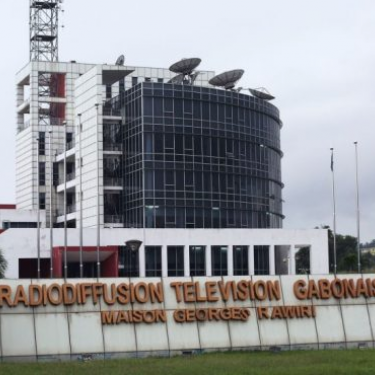Gabon public media strike over government meddling

Reporters Without Borders (RSF) urges the authorities to respect public broadcast media independence in Gabon, where nearly 700 employees at state-owned Radio Gabon and Gabon Télévision have been on strike since 30 April in protest against government meddling in editorial policy, unpaid salaries and antiquated equipment.
Called by the Union of Communication Professionals (SYPROCOM), the strike is unprecedented in scale. The provision of news has been reduced to a minimum service consisting of two daily news bulletins on the two TV news channels. No other programmes are being broadcast.
“For the past two years, the communication minister has been in the habit of issuing instructions to editorial staff, so that everything functions to his liking,” SYPROCOM vice-president Edgard Ndziembi Doukaga told RSF. The grievances of the striking journalists include the government’s management of Gabon 24, a parallel public TV news channel created in 2016 that is directly attached to the communication ministry. Its journalists are paid almost twice what their counterparts at Gabon TV get (or are supposed to get, only they have not been paid for more than a year). During a broadcast on Gabon 24 in March, in which the agriculture minister was a guest, the channel’s director-general received a phone call from the communication minister ordering him to stop the broadcast. The director-general carried out the instruction to the letter: the programme was immediately interrupted.
SYPROCOM representative Angèle Révignet also criticized the way the communication minister organized auditions for Gabon TV and Radio Gabon presenters in order to teach them to present the news “in the way he likes.” Révignet added: “It’s very simple: everything is managed at the ministry, from the programming to the financing.” When reached by RSF, communication minister Alain Claude Bilie By Nze confirmed that he had organized these auditions. “There is nothing wrong with that,” he said. “I asked for qualified professionals, who were free to refuse.”
The striking journalists are demanding a return to editorial independence within the public broadcast media, which continue to be the main source of news and information for the Gabonese public, both in the capital, Libreville, and in the provinces.
“After being turned into what seem to be little more than government PR operations, Gabon’s public broadcast media have not only lost their credibility but also the support of their journalists,” said Arnaud Froger, the head of RSF’s Africa desk. “The authorities should respond to this show of discontent by finally developing real public service media that are not subject to interference and provide an impartial news service for all Gabonese.”
Gabon is ranked 108th out of 180 countries in RSF's 2018 World Press Freedom Index, the same position as last year.



